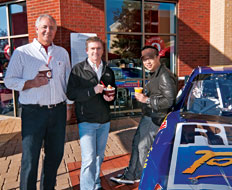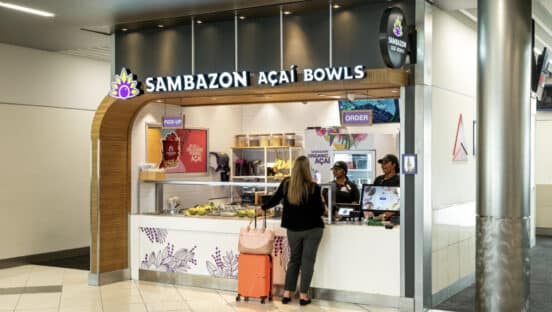On a brisk 50-degree Saturday afternoon in High Point, North Carolina, Red Mango founder Dan Kim and NASCAR driver Bobby Labonte greeted nearly 800 customers at the frozen yogurt concept’s newest store.
Smiles filled the restaurant as customers enjoyed a free yogurt, snapped pictures, and celebrated the opening of the savory establishment.
“In today’s fast-paced world, I see the hectic, multitasking lives people lead,” Labonte says. “People want to get in
and get out with something they enjoy in hand. Red Mango can be just that product.”
For Labonte, who’s made a career of rushing around racetrack curves, his latest adventure as Red Mango franchisee seems an odd turn. Yet a closer look reveals logical ties between the athlete and the role of quick-service franchisee. There’s the shared risk-reward mindset, a commitment to teamwork, the ability to strategize, and a drive to win.
For the franchisee as much as the athlete, Labonte says, “It all starts with passion.”
It’s those characteristics combined with athletes’ financial means that have quick-service franchisors and athletes increasingly linking up as teammates.
NBA great Magic Johnson, an often-cited example of post-athletic success, owns a business empire that includes a string of Starbucks stores. Shaquille O’Neal’s franchise group oversees 19 Auntie Anne’s. NFL quarterback Drew Brees is a Jimmy John’s franchisee, while tennis star Venus Williams entered the Jamba Juice system last summer.
Although athletes may earn a nice chunk of money during their playing days—average annual salaries are about $2 million in the NFL, $3 million in MLB, and more than $5 million in the NBA—careers last on average less than four years. For nearly all pro athletes, the end brings the sobering reality that the skill they’ve been honing for years is no longer a moneymaker.
Motivated by their professional leagues, teammates, and horror stories of evaporated earnings, a growing number of athletes are examining life beyond sports with a critical eye.
New York-–based attorney Daniel Etna, who consults a number of NFL and NBA players on private investments, says athletes are routinely pulled into hospitality and entertainment ventures.
“Those are the low-hanging apples on the tree of forbidden fruit that athletes just can’t seem to resist,” Etna says.
With restaurants, Etna says, astute athletes see the franchising model as a lower-risk venture—even if franchising limits the individuality they can bring to the business.
Milwaukee Bucks forward Drew Gooden is one such example. Last summer, Gooden inked a deal with Wingstop to open four stores in Orlando, Florida, the first of which will open this summer. Playing in his 10th NBA season, the 30-year-old Gooden says frankly that “basketball won’t last forever,” and he’s prepared diligently for life beyond the hardwood.
Gooden was attracted to franchising’s reliable systems. “There’s no need to reinvent the wheel,” he says. “Franchising means I don’t have to start from scratch.”
The franchise system also allows athletes to tap into athletic attributes that translate well to the restaurant business. For example, athletes are entrepreneurial and undeterred by risk and hard work. They’ve developed thick skins and the ability to perform in challenging conditions. More so, many are eager to attach their name to something beyond sports.
There’s appeal on the franchisor’s side, as well.
Restaurant management teams know most athletes possess the financial power to buy into their systems. Most athletes are also comfortable working within the confines of an established system and executing a playbook, and are responsive to coaching.
“When you bring this all together, you can create successful results,” Auntie Anne’s president and COO Bill Dunn says.
Dunkin’ Brands senior director of franchise sales, Jeremy Vitaro, says athletes can also generate excitement for a brand given their notoriety and community ties. Dunkin’ Donuts franchisee and former NFL lineman Jumbo Elliott regularly attends charity events and golf tournaments in the New York metro area, which drives exposure for both Dunkin’ Donuts and Elliott’s stores. Auntie Anne’s has even summoned O’Neal to entertain its landlords.
After nearly 30 years in the restaurant franchising industry, however, Fran-Systems CEO Karen Spencer is skeptical about brands over-leveraging an athlete’s popularity.
“Rarely was it because you believed [the athlete] could open a store,” Spencer says.
One notable example was Atlanta-based burger concept D’Lites. Founded in 1981, D’Lites had its eyes set on 1,000 units by the early 1990s and, in a rush to expand its presence and profile, signed football star Herschel Walker to a multistore deal in 1984. The buzz sparked the company’s 1984 IPO to produce $14.2 million.
Blinded by its success, D’Lites focused more on celebrated names and store counts than franchisee support and a stable operations model. By mid-1986, Walker was out of the system. By the end of 1987, D’Lites sat in bankruptcy.
“This relationship never works if an athlete or the franchisor is only interested in attaching to the other’s name,” Spencer says.
The boom and bust of D’Lites and other brands was a warning to the industry.
Franchisors, largely driven by recession-era economics, have recognized the wisdom of returning to the basics of sound operations. Today, wise franchisors understand they must thoroughly vet all franchisees regardless of their individual fame and that lax corporate support impacts both unit-level economics and growth.
[pagebreak]
“We’ve reached a tipping point,” Spencer says. “The good franchisors have responded with support and recognized that if they’re going to grow, they need strong operations above all else.”
More athletes are also seeking financial and legal advice before signing onto a franchised brand.
Whenever asked for counsel on a restaurant venture of any type, Etna tells clients: “If you want to wine and dine, then you have to do the time.”
NBA forward Gooden did just that before formally entering any agreements. He investigated other quick serves, including Five Guys and Jimmy John’s, and reached out to Wingstop (which also counts football players Willie McGinest, Raheem Brock, and Ron Stone among its franchisees) on his own accord.
When he was a member of the Mavericks, he would routinely visit a Dallas store before road trips to bring a 100-wing order onto the team plane. His teammates’ hunger for the wings fed Gooden’s entrepreneurial instincts. So he filled out the franchise application online and directed his accountant to follow up with Wingstop’s corporate office.
Gooden later attended a nine-hour Discovery Day with Wingstop officials. He listened to presentations on marketing and development, and shared a candid conversation with Wingstop spokesman and NFL Hall of Famer Troy Aikman about post-career plans.
“[Gooden] took the entire process to heart, and that was important for us to see,” says Dave Vernon, senior vice president of development at Wingstop. “He’s a guy with good people around him. He receives solid financial advice, and he understands the value in having a partner with operational control.”
Spencer says smart franchisors either demand an industry professional as an operating partner or require the athlete to undertake the full training program, including hands-on work with an established operator.
“Otherwise, you could be setting yourself up to buy a franchise back or save it from failing,” Spencer says.
In preparing to open his Wingstop outlets, Gooden interviewed a handful of experienced operators before tabbing a 12-year restaurant veteran who impressed him with his work ethic and smarts.
“At the end of the day, you want to give the first right of authority to the professional in that field and someone you trust,” Gooden says. “He can’t play my position, and I can’t play his.”
Not all athletes are so well prepared for a business venture. If franchisors are successful in gaining an athlete’s ear, integrating them into their system can have its challenges—most notably the mismanagement of finances.
A 2009 Sports Illustrated feature reported that within two years of retirement, “78 percent of former NFL players have gone bankrupt or are under financial stress,” while “an estimated 60 percent of former NBA players are broke” within five years of retirement.
Some athletes lack the time, interest, or motivation to understand and monitor their investments. For others, the thrill of sexier ventures trump sound financial investing.
For every Magic Johnson, there are multiple counterparts who have jumped into the restaurant franchising pool without the necessary swimming skills. In his June 2010 bankruptcy filing, NFL quarterback Mark Brunell, who’s estimated to have made more than $50 million over his 19-year NFL career, cited a bungled investment in 12 Florida-based Whataburger franchises as a key contributor to his financial misery.
Most often, failures tend to arise when athletes don’t understand what they’re purchasing.
“The franchisor may teach you how to cut the chicken, but he won’t teach you how to be a business owner,” says Spencer, who calls athlete franchisees a “mixed bag of success and failures.”
Fortunately, there is an emerging movement to reach out to athletes and help them understand franchising culture, including the need to fit within a system and follow strict operational standards.
Dunkin’ Brands, Jersey Mike’s, and Moe’s Southwest Grill are among the earliest quick-service members of the budding Professional Athlete Franchise Initiative (PAFI), an organization started in late 2010 by former NFL cornerback Michael Stone to educate athletes on the franchising world and link them to established franchisors.
“Athletes are bombarded by different business propositions,” says Dunkin’s Vitaro, noting that successful athlete franchisees in a system quickly boost credibility for quick serves.
To stand out from the crowd, Auntie Anne’s participated in an NBA Retired Players Association event at the NBA’s All-Star weekend in 2011. This allowed the Pennsylvania-based brand to serve its pretzels and discuss franchise opportunities with athletes.
“With so many athletes seeking a transition to life beyond sports, we want to open their minds to franchising as a possibility because it’s a model with attractive qualities,” says Stone, whose organization recently formalized a partnership with the International Franchise Association (IFA) to develop the Athlete Franchise Education Program.
The program pairs players with multiunit systems during their off seasons to provide training and real-world insights into the franchising world.
PAFI also works with professional athlete groups, including the Canadian Football League and the National Basketball Retired Players Association, to raise awareness about franchising.
Spencer suggests companies even establish an athlete incentive program, similar to the deals many concepts offer to military veterans. Laying out the precise specifications, she says, will help athletes discern if franchising is the right move for them.
“With a formal program, a brand can clearly define the parameters and allow franchisors to stand their ground on entry,” she says.
“There’s no one-size-fits-all approach,” Dunn says, “but it’s clear both sides need to understand one another and what motivates the other.”
With a mutual understanding of needs, motivations, and goals, he says, enthusiastic scenes like the one Labonte and Kim created at the North Carolina Red Mango store are more likely to be repeated.
“Ultimately, we need to find the solution that puts everybody in the right spot to succeed,” Dunn says.







